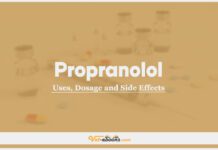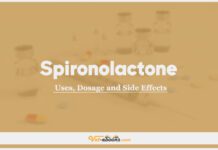Mexiletine In Dogs & Cats: Uses, Dosage and Side Effects

Overview
- Antiarrhythmic agent of class 1b, similar to lidocaine.
- It inhibits the inward sodium current (fast sodium channel), slowing the rate of rise of the action potential.
- It reduces automaticity, action potential duration, and effective refractory period in Purkinje fibres.
Uses of Mexiletine
- Management of rapid or hemodynamically significant ventricular arrhythmias, such as frequent complex ventricular premature complexes or ventricular tachycardia, has been demonstrated.
- Effective in certain dogs with supraventricular tachycardia caused by the presence of an accessory conduction pathway, also known as a bypass tract.
Dose of Mexiletine in Dogs and Cats
Dogs:
- Oral: 4–8 mg/kg p.o. q8–12h.
- Dose for i.v. not established for dogs.
Cats:
- No information is available.
Drug Dosage Calculator
You Should Give:
Side Effects of Mexiletine in Dogs and Cats
- Nausea, anorexia, vomiting, depression, convulsions, tremor, nystagmus, bradycardia, hypotension, jaundice and hepatitis
Contraindications of Mexiletine in Dogs and Cats
- 2nd or 3rd degree AV block not treated by pacemaker therapy.
Some Notes:
- The administration of atropine and opioid analgesics has the potential to cause a delay in the absorption of mexiletine.
- The excretion of Mexiletine may potentially be diminished by the use of acetazolamide and alkaline urine, while it may be enhanced by the use of urinary acidifying medications such as methionine.
- Hypokalemia has the potential to antagonise the activity of mexiletine.
- Cimetidine has been seen to exert a suppressive effect on the elimination rate of mexiletine.
- The administration of intravenous lidocaine has demonstrated efficacy in cases where a response has been observed.
- Oral beta-blockers, such as atenolol at a dosage of 0.5-1 mg/kg every 12-24 hours, can be concurrently administered.
- There is currently insufficient evidence to support the effectiveness of this intervention in mitigating sudden mortality in canines afflicted with severe ventricular arrhythmias.
- Extreme caution should be exercised when administering this treatment to individuals who have severe congestive heart failure, sinus node dysfunction, hepatic dysfunction, or seizure disorders.
- To mitigate gastrointestinal side effects, it is recommended to provide the oral dose in conjunction with a meal.
Tip
Do You Want To Increase Your Veterinary Knowledge and Practical Skills?
You Can Now Browse and Download +3000 Books For Veterinary Professionals & Students Online.
Download Veterinary Books




















